Unit 6 Space and beyond Using ideas课件(共45张PPT)外研版(2019)选择性必修第四册
文档属性
| 名称 | Unit 6 Space and beyond Using ideas课件(共45张PPT)外研版(2019)选择性必修第四册 | 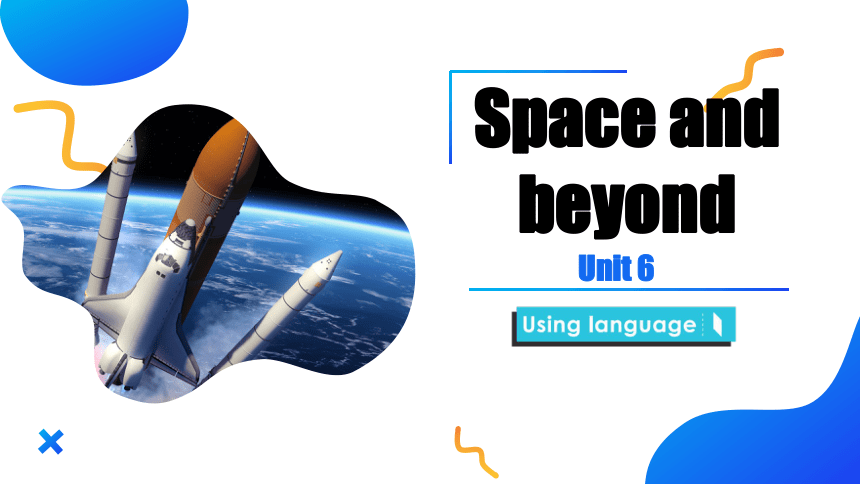 | |
| 格式 | pptx | ||
| 文件大小 | 81.3MB | ||
| 资源类型 | 教案 | ||
| 版本资源 | 外研版(2019) | ||
| 科目 | 英语 | ||
| 更新时间 | 2025-04-24 19:28:52 | ||
图片预览

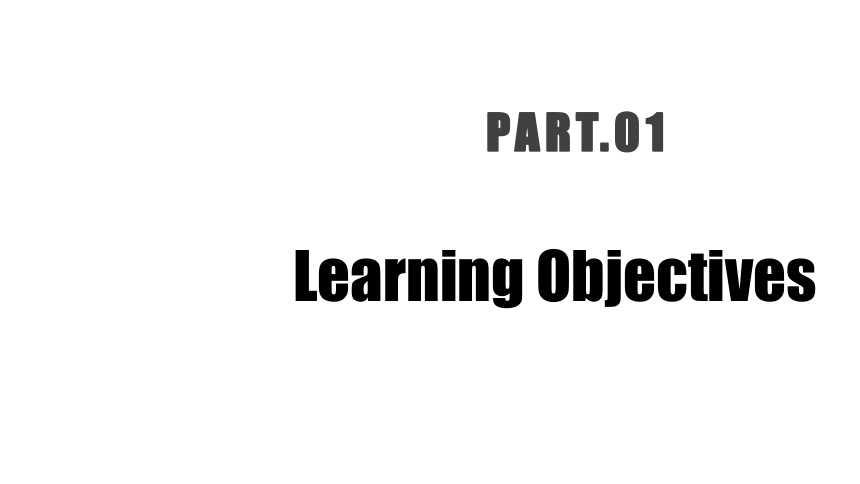
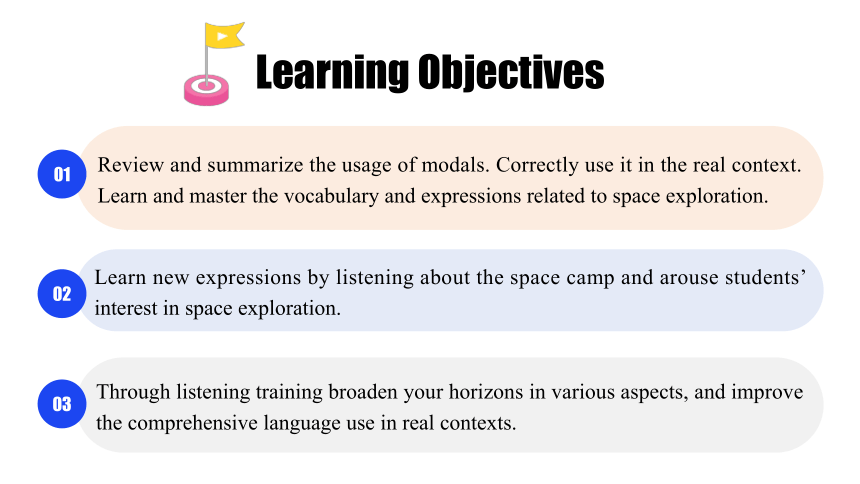
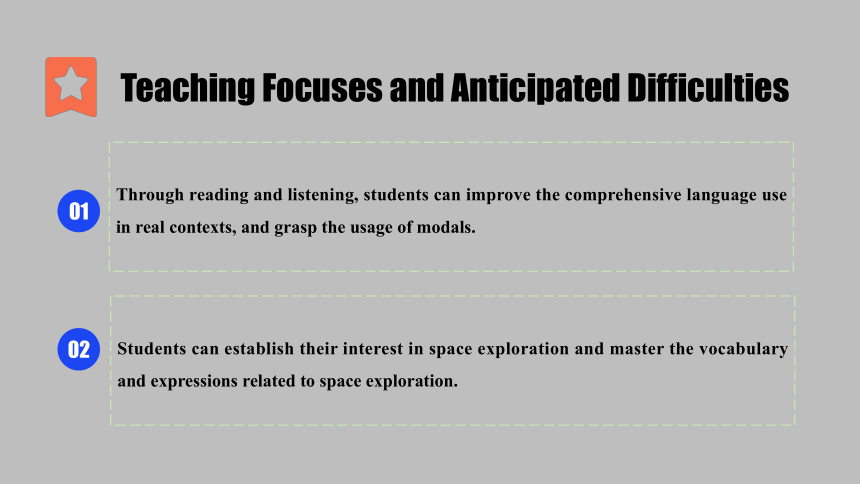
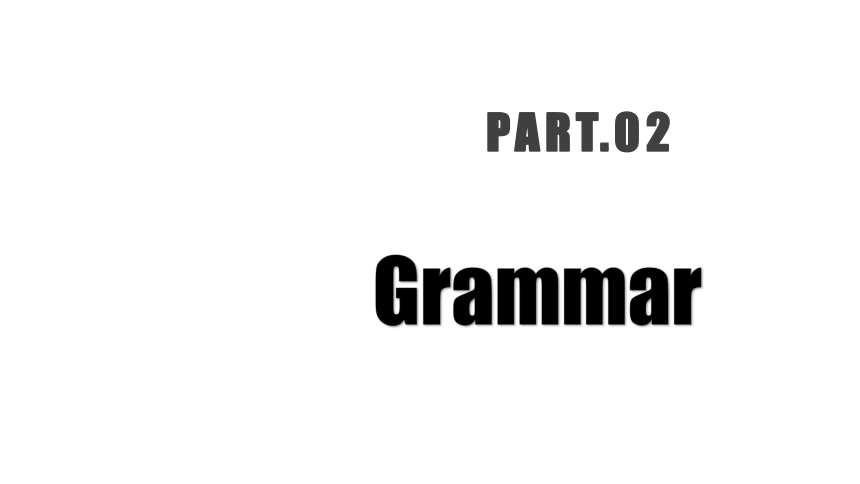
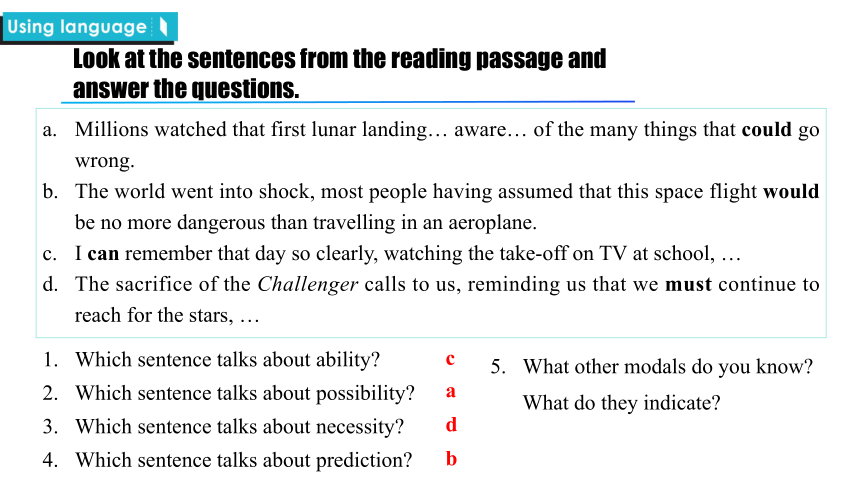
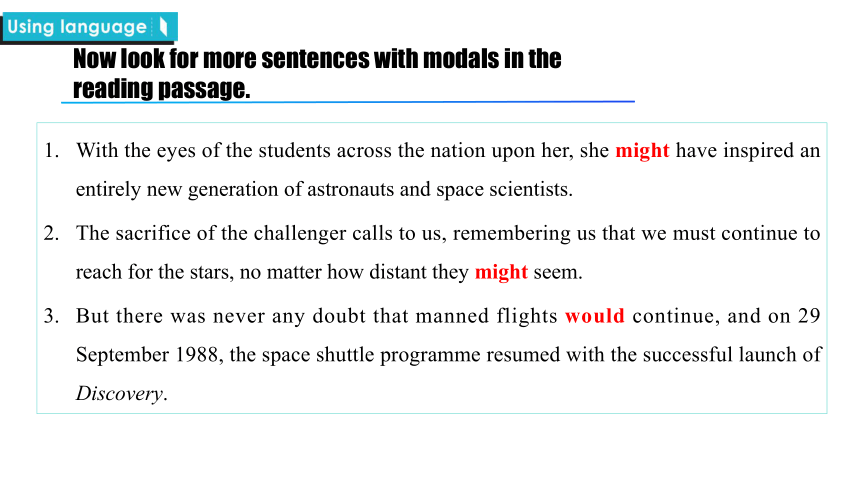
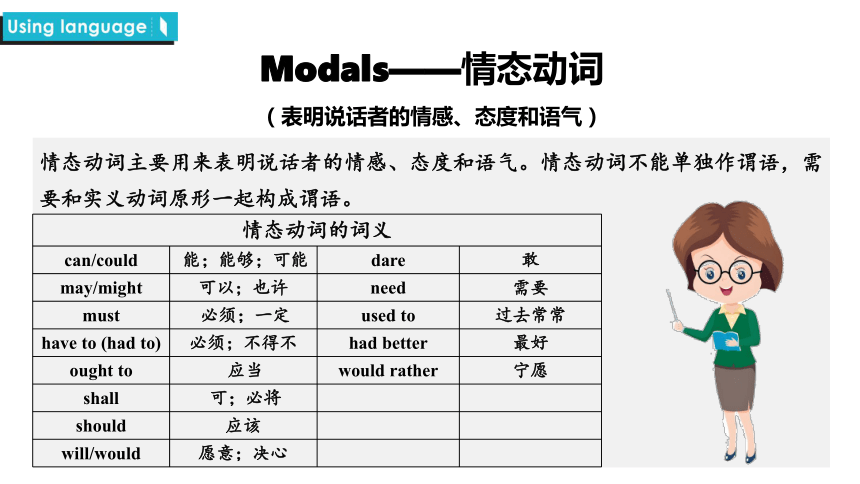
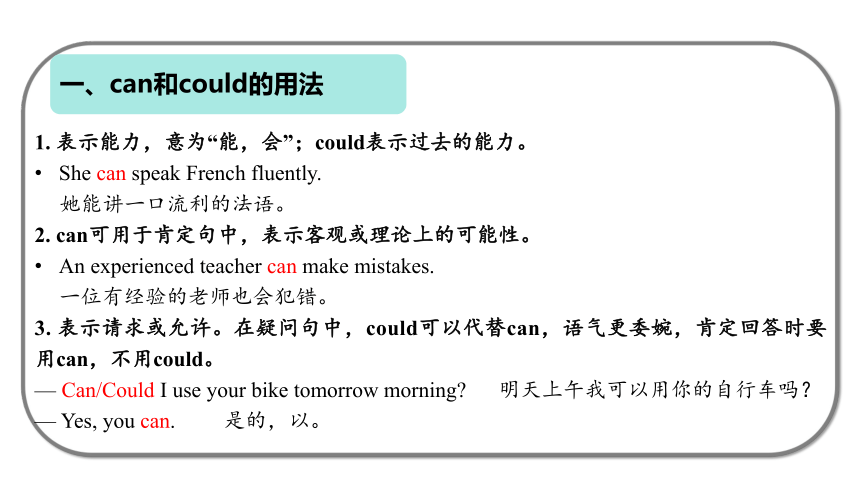
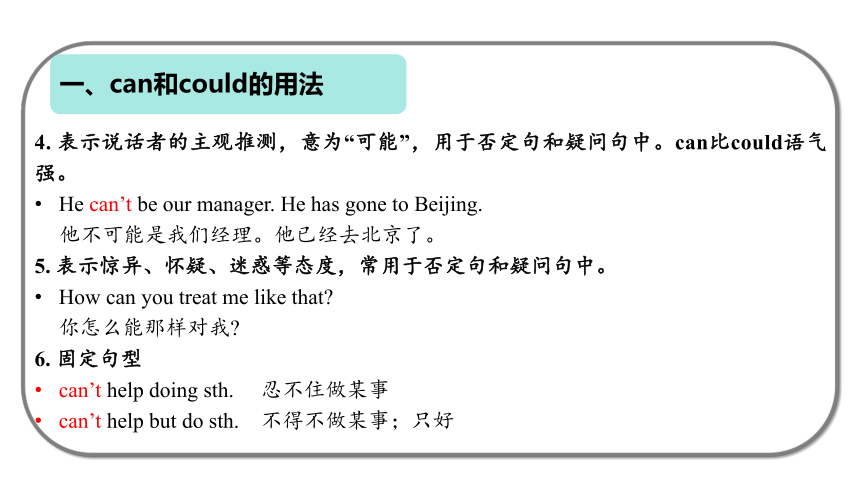
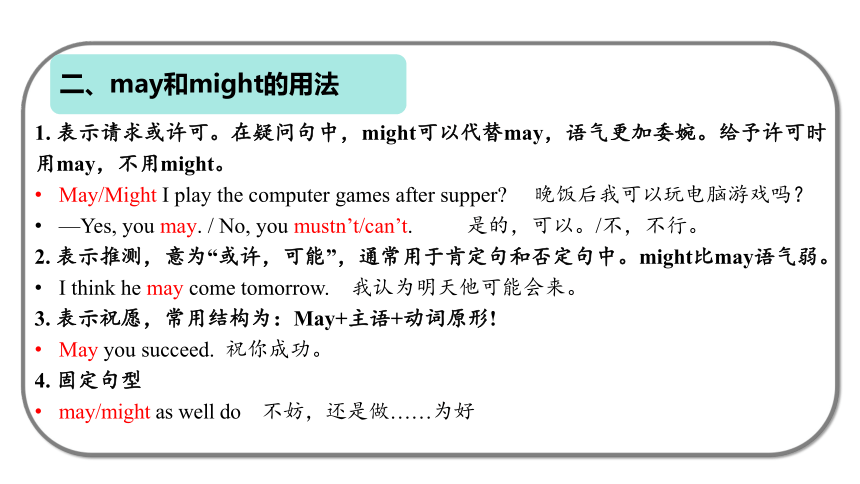
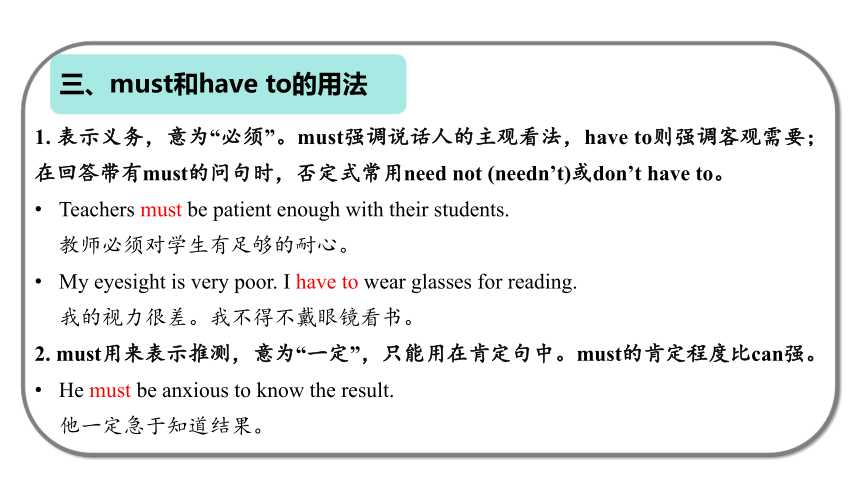
文档简介
(共45张PPT)
Space and beyond
Unit 6
PART.01
Learning Objectives
Review and summarize the usage of modals. Correctly use it in the real context. Learn and master the vocabulary and expressions related to space exploration.
01
Through listening training broaden your horizons in various aspects, and improve the comprehensive language use in real contexts.
03
Learn new expressions by listening about the space camp and arouse students’ interest in space exploration.
02
Learning Objectives
Through reading and listening, students can improve the comprehensive language use in real contexts, and grasp the usage of modals.
Students can establish their interest in space exploration and master the vocabulary and expressions related to space exploration.
01
02
Teaching Focuses and Anticipated Difficulties
PART.02
Grammar
Millions watched that first lunar landing… aware… of the many things that could go wrong.
The world went into shock, most people having assumed that this space flight would be no more dangerous than travelling in an aeroplane.
I can remember that day so clearly, watching the take-off on TV at school, …
The sacrifice of the Challenger calls to us, reminding us that we must continue to reach for the stars, …
Look at the sentences from the reading passage and answer the questions.
01
Which sentence talks about ability
Which sentence talks about possibility
Which sentence talks about necessity
Which sentence talks about prediction
c
a
d
b
5. What other modals do you know
What do they indicate
Now look for more sentences with modals in the reading passage.
With the eyes of the students across the nation upon her, she might have inspired an entirely new generation of astronauts and space scientists.
The sacrifice of the challenger calls to us, remembering us that we must continue to reach for the stars, no matter how distant they might seem.
But there was never any doubt that manned flights would continue, and on 29 September 1988, the space shuttle programme resumed with the successful launch of Discovery.
Modals——情态动词
(表明说话者的情感、态度和语气)
情态动词主要用来表明说话者的情感、态度和语气。情态动词不能单独作谓语,需要和实义动词原形一起构成谓语。
情态动词的词义 can/could 能;能够;可能 dare 敢
may/might 可以;也许 need 需要
must 必须;一定 used to 过去常常
have to (had to) 必须;不得不 had better 最好
ought to 应当 would rather 宁愿
shall 可;必将
should 应该
will/would 愿意;决心
1. 表示能力,意为“能,会”;could表示过去的能力。
She can speak French fluently.
她能讲一口流利的法语。
2. can可用于肯定句中,表示客观或理论上的可能性。
An experienced teacher can make mistakes.
一位有经验的老师也会犯错。
3. 表示请求或允许。在疑问句中,could可以代替can,语气更委婉,肯定回答时要用can,不用could。
— Can/Could I use your bike tomorrow morning 明天上午我可以用你的自行车吗?
— Yes, you can. 是的,以。
一、can和could的用法
4. 表示说话者的主观推测,意为“可能”,用于否定句和疑问句中。can比could语气强。
He can’t be our manager. He has gone to Beijing.
他不可能是我们经理。他已经去北京了。
5. 表示惊异、怀疑、迷惑等态度,常用于否定句和疑问句中。
How can you treat me like that
你怎么能那样对我
6. 固定句型
can’t help doing sth. 忍不住做某事
can’t help but do sth. 不得不做某事;只好
一、can和could的用法
1. 表示请求或许可。在疑问句中,might可以代替may,语气更加委婉。给予许可时用may,不用might。
May/Might I play the computer games after supper 晚饭后我可以玩电脑游戏吗?
—Yes, you may. / No, you mustn’t/can’t. 是的,可以。/不,不行。
2. 表示推测,意为“或许,可能”,通常用于肯定句和否定句中。might比may语气弱。
I think he may come tomorrow. 我认为明天他可能会来。
3. 表示祝愿,常用结构为:May+主语+动词原形!
May you succeed. 祝你成功。
4. 固定句型
may/might as well do 不妨,还是做……为好
二、may和might的用法
1. 表示义务,意为“必须”。must强调说话人的主观看法,have to则强调客观需要;在回答带有must的问句时,否定式常用need not (needn’t)或don’t have to。
Teachers must be patient enough with their students.
教师必须对学生有足够的耐心。
My eyesight is very poor. I have to wear glasses for reading.
我的视力很差。我不得不戴眼镜看书。
2. must用来表示推测,意为“一定”,只能用在肯定句中。must的肯定程度比can强。
He must be anxious to know the result.
他一定急于知道结果。
三、must和have to的用法
3. must表示“偏要,非要……不可”。常用于疑问句和条件句中,偶尔也用于陈述句中。
Why must you be so stubborn
你为什么偏要这么固执?
4. mustn’t表示禁止,意为“不得,不允许;一定不要”,而“don’t have to”意为“没必要”,相当于needn’t。
You mustn’t play with the knife, or you may hurt yourself.
你千万不要玩刀,否则会伤到自己的
三、must和have to的用法
1. shall用于第一、第三人称的一般疑问句,表示说话人征求对方的意见或向对方请示。should用于第一、第三人称的间接引语中,表示说话人征求对方的意见。ought to用于第一人称,表示有义务或有必要做某事,语气比should弱。
A man is asking to see you. Shall he come in 有个男人要见你,他能进来吗?
I asked the manager if I should have a few days off. 我问经理我是否应该休息几天。
We ought to respect the old. 我们应该尊重老人。
2. should表示含有一定依据的推测,意为“按理应该”。
The film should be very good as it is starring first-class actors.
这部电影应该很好,因为它是由一流的演员主演的。
四、shall、ought to与should的用法
3. shall用于第三人称,表示按条约、法令、规章等必须履行的义务。should表示义务、职责、建议等,意为“应该,应当”。
One of our rules is that every student shall wear school uniform while at school.
我们的规定之一是每个学生在校期间必须穿校服。
You should be polite to your teachers. 你应该对老师有礼貌。
4. shall用于第二、第三人称陈述句中,表示说话人给对方的命令、警告、允诺或威胁以及说话人的决心等。
You shall fall behind in your exam if you keep playing. 如果你继续玩下去,考试就会落后。
5. should表示惊讶、遗憾等感彩,意为“竟然”。
Such a gentleman should do that. 这样一位绅士竟然会做那种事。
四、shall、ought to与should的用法
五、will和would的用法
1. 用于各种人称,表示主语的意志、愿望和决心。
I will never talk to him again. 我再也不会和他说话了。
2. 表示征求意见或提出请求,多与主语是第二人称的一般疑问句连用,would比will语气委婉。
Will/Would you please close the window 请把窗户关上好吗
3. 表示习惯性动作、固有属性或必然趋势,意为“总是;习惯于”。will指现在,would指过去。
Every evening, she would sit by the window, deep in thought.
每天晚上,她都会坐在窗边,陷入沉思。
1. used to do意为“过去常常做”,表示过去的习惯动作或状态,暗指现在已不复如此。只有过去时,在间接引语中形式不变,不能表示现在或将来。
There used to be a building at the street corner, but now it is a library.
街道拐角处过去有座楼房,而现在是一个图书馆。
2. had better (not)意为“最好(不)做”,常用来表示一种委婉、客气的建议或劝告,没有词形变化,既可指现在,也可指将来,后接不带to的不定式。
One had better see life in its various aspects when young.
一个人最好在年轻时就能看到生活的各个方面。
六、其他情态动词的用法
3. would rather意为“宁愿”,没有词形变化,后接不带to的不定式,可表示“过去意愿做了某事而实际上并未做成”。
I would rather stare at the star-filled sky than watch a TV set.
我宁可凝视繁星满天的夜空也不愿看电视。
4. dare意为“敢,胆敢”,作情态动词时后跟动词原形,主要用于疑问句、否定句和条件句中。
She dares not say what she thinks. 她不敢说出自己的想法。
5. need 表示必要性,常用于疑问句和否定句中,needn’t 表示“不必”;对need引出的一般疑问句作肯定回答时用must而不用need,作否定回答时用needn’t。
— Need I hand in the application now ——我现在需要交申请吗?
— Yes, you must. / No, you needn’t. ——是的,你必须。/ 不,你不必。
六、其他情态动词的用法
七、情态动词+have done的用法
结构 含义 例句
can/could have done 本来能够做而未做 过去可能会做 John could have posted the letter.
can’t/couldn’t have done 过去不可能做 过去没能够做 Mr Smith can’t have gone to Beijing, for I saw him in the library just now.
may/might have done 也许已经做了 You might have read about the news in the papers.
must have done 准是/一定做了 From what you said, she must have told you all about it.
needn’t have done 本来不必做而实际上已经做了 You needn’t have watered the flowers, for it’s going to rain.
should/ought to have done 本来应该做而实际上没有做 Yesterday was the deadline, and he should have completed his work.
Read the passage and choose the correct modals.
02
On 15 October 1997, the Cassini spacecraft set out on a mission to explore the planet Saturn. So great was the distance from Earth that it would / shall need to travel for almost six years to reach its destination. When it reached Saturn, it sent back amazing images of the planet’s famous rings viewed in ultraviolet light. Cassini made numerous trips around Saturn so it could / must collect data. Over the following years, Cassini took some 450,000 images of the planet and its moons. Finally, on 15 September 2017, Cassini was pointed towards Saturn so that it should / would meet a fiery end. Scientists had decided that Cassini could / must be destroyed this way, so it must / would not collide with any of Saturn’s moons. In its nearly 20-year mission, Cassini provided so much information that scientists could / would not process it all. No wonder so many people took to social media to bid it goodbye, saying, “Farewell, dear Cassini! We shall / should never forget you!”
Look at the picture and tell a story using modals
where appropriate.
03
I couldn’t believe it when I looked into the Martian sky ...
I couldn’t believe it when I looked into the Martian sky. It’s scary but beautiful-Martian-red dirt dotted with unknown plants, chocolate-brown mountain ranges and a sky that makes Martian sky look like the glow of a flame. Without special glasses, I couldn’t see much because the light is too bright. Besides, it must be too hot in the day and too cold in the evening so that I should wear a kind of coat to live a normal life there.
Work in pairs. Take it in turns to draw a picture of space exploration and ask your partner to tell a story based on it. Use modals where appropriate.
04
1. submit
submit sth to sb 向某人提交某物
submit to 向……屈服
submission n. 提交;投降;屈服
练习:
The deadline for thesis ____________(submit) is approaching, and she is working day and night to finalize her research paper.
After days of negotiation, the union finally decided to submit __________ some of the company’s terms to avoid a strike.
submission
to
PART.03
Listening
Are we the only life in the space
The Fermi Paradox: according to some calculations, there should be many other civilisations out there, but there is no evidence of these at all. No spacecraft, no radio transmissions, nothing. So, as Fermi said, ”Where is everybody ”
Did You Know
Listen to the interview and choose the questions discussed.
05
Is there life on other planets
What would life on other planets look like
Should we use robots to explore space
What is the Fermi Paradox
Will people ever make contact with life on other planets
Listen again and complete the table.
06
Answers
Q1 Sophie: There must be millions of planets like ours, and some could have life 1_________________.
Eric: You would think it likely that 2 ___________________________. But that’s 3 ________________ the Fermi Paradox.
Q2 Sophie: Life on other planets won’t look like us because
4 ______________________________________________.
Eric: Evolution 5 ________________________________, so it’s likely that life on other planets would look like us.
Q3 Eric: We cannot 6 ___________________, which means it would take more than a lifetime to reach planets where there might be life.
Sophie: Maybe we don’t need to travel in straight lines. Perhaps we will be able to
7 _________________________________________________ to make contact with life on other planets.
similar to our own
there are forms of life somewhere
without considering
conditions on other planets won’t be like those on Earth
would work the same way everywhere
travel faster than light
take short cuts, through a “warmhole” in space, for example
Now work in groups of three and act out the interview.
Complete the boxes with the expressions from the interview.
07
I think there definitely is.
Since ..., it isn’t reasonable to ...
There’s evidence that ...
It would be wonderful if ...
The fact that ... means ...
Let’s hope that ...
I think there definitely is.
Since …, it isn’t reasonable to …
There’s evidence that …
The fact that ... means …
It would be wonderful if …
Let’s hope that …
Expressing opinions
Expressing hopes
The dramatic scientific developments of recent years have brought space exploration back to public attention. As getting into space is however, still not an easy task, more and more space camps and other places are providing simulated space adventures. The Space Camp, founded in 1982 under NASA, is an educational camp, where children can learn about space travel and astronomy, and even have the chance to have lunch with an astronaut! So far, the camp has inspired hundreds of thousands of young people from the US and from elsewhere around the world. What’s more, some of its ex-students have even grown up to become astronauts!
Work in pairs. Read the passage and answer the questions.
08
1. What is the passage mainly about
The passage is mainly about the Space Camp.
2. Would you like to take part in a space camp Why or why not
Read the advertisement for the space camp and find out what students can do there. Pay attention to the words and expressions in bold.
09
Sign up for our space programme now and give your knowledge of aviation and space a boost! Here at the observatory, you can learn about astronomy and take in a lunar eclipse.You will also have the chance to design and launch a model rocket. Then, join your mission teammates in our modern flight simulators. Put on a spacesuit, exit the capsule and go on your incredibly lifelike spacewalk in a world with zero gravity. Scared of being space sick Don't worry! Your special training will take care of this. Make the most of your lunar exploration adventure before re-entering into the atmosphere on your way back to Earth.
◎ observatory ◎ capsule
◎ lunar eclipse ◎ spacewalk
◎ launch a model rocket ◎ zero gravity
◎ put on a spacesuit ◎ space sick
Read the advertisement for the space camp and find out what students can do there. Pay attention to the words and expressions in bold.
09
月食
发射模拟火箭
穿上太空服
天文台
太空舱,航天舱
太空行走
零重力,失重
太空病
Read the advertisement for the space camp and find out what students can do there. Pay attention to the words and expressions in bold.
09
At the observatory, you can learn about astronomy and take in a lunar eclipse. You will also have the chance to design and launch a model rocket. Then in modern flight simulators, you could put on a spacesuit, exit the capsule and go on your incredibly lifelike spacewalk in a world with zero gravity.
Complete the email with the correct form of the words
and expressions.
10
Dear Ted,
Remember when I told you I’d signed up for the space programme Well I just got back from a week of simulated manned flight activities, and it was awesome!
We started out with some theory, learning about astronomy in the 1___________, and then 2_________ model rockets. After that we tried the simulator. I put on a 3__________ and went for a walk in 4_____________________. It’s strange to float around like that — in fact, a lot of people get 5___________! Luckily, I felt fine. Then I returned to the 6__________ and travelled to the “Moon” for some lunar exploration. You should join the programme too — you’d love it!
Write soon!
Yours,
Kim
observatory
launched
spacesuit
a world with zero gravity
space sick
capsule
Imagine you are going to apply for the programme. Organise your ideas for the short video by answering the questions.
11
1. Why do you want to take part in the programme
2. What activities would you like to experience
3. What is it about space that most interests you
What have you learnt about it
Present your ideas for the short video in class using the words and expressions in this section.
12
Now think about how well you structured your introduction and what you could do to improve.
PART.04
Exercise
1. Mary has gone to Guangzhou, so she _______ be in Shenzhen at present.
2. He _______ have completed his work; otherwise, he wouldn’t be enjoying himself by the seaside.
3. Parents ________ put the things like knives and medicine away in the house to keep children safe.
4. You’d better send Lisa back home, because it’s too late and she _______ not go home alone at night.
5. You _____ not return the book now. You can keep it till next week if you like.
6. The writer in his letter suggests that we _______ treat people with kindness, generosity and love.
7. My younger sister always sets the alarm clock at 6:00 am so that she ______ get up early and catch the bus.
must
can’t
should
dare
Exercise 填写合适的情态动词
need
should
can
Exercise
1. Students are required to s_________(提交) their essays before Friday afternoon.
2. Scientists conducted a s____________(模拟的) experiment to study the effects of climate change on coral reefs in a controlled laboratory environment.
3. This artist’s paintings are renowned for their l_________(逼真的) depictions of rural landscapes, capturing every detail of the fields and cottages.
4. This new smartphone has an a___________(了不起的) camera that can take clear photos even in low-light conditions.
ifelike
wesome
ubmit
imulated
PART.05
Summary
Using language
Listening
Grammar
Vocabulary
can和could
may和might
must和have to
shall, ought to和should
情态动词
will和would
其他情态动词
情态动词+have done
PART.06
Homework
Homework
1. Review the usage of modals and do the relevant exercises;
2. Talk about the Space Camp using the words and expressions in this section.
See you next class!
Space and beyond
Unit 6
PART.01
Learning Objectives
Review and summarize the usage of modals. Correctly use it in the real context. Learn and master the vocabulary and expressions related to space exploration.
01
Through listening training broaden your horizons in various aspects, and improve the comprehensive language use in real contexts.
03
Learn new expressions by listening about the space camp and arouse students’ interest in space exploration.
02
Learning Objectives
Through reading and listening, students can improve the comprehensive language use in real contexts, and grasp the usage of modals.
Students can establish their interest in space exploration and master the vocabulary and expressions related to space exploration.
01
02
Teaching Focuses and Anticipated Difficulties
PART.02
Grammar
Millions watched that first lunar landing… aware… of the many things that could go wrong.
The world went into shock, most people having assumed that this space flight would be no more dangerous than travelling in an aeroplane.
I can remember that day so clearly, watching the take-off on TV at school, …
The sacrifice of the Challenger calls to us, reminding us that we must continue to reach for the stars, …
Look at the sentences from the reading passage and answer the questions.
01
Which sentence talks about ability
Which sentence talks about possibility
Which sentence talks about necessity
Which sentence talks about prediction
c
a
d
b
5. What other modals do you know
What do they indicate
Now look for more sentences with modals in the reading passage.
With the eyes of the students across the nation upon her, she might have inspired an entirely new generation of astronauts and space scientists.
The sacrifice of the challenger calls to us, remembering us that we must continue to reach for the stars, no matter how distant they might seem.
But there was never any doubt that manned flights would continue, and on 29 September 1988, the space shuttle programme resumed with the successful launch of Discovery.
Modals——情态动词
(表明说话者的情感、态度和语气)
情态动词主要用来表明说话者的情感、态度和语气。情态动词不能单独作谓语,需要和实义动词原形一起构成谓语。
情态动词的词义 can/could 能;能够;可能 dare 敢
may/might 可以;也许 need 需要
must 必须;一定 used to 过去常常
have to (had to) 必须;不得不 had better 最好
ought to 应当 would rather 宁愿
shall 可;必将
should 应该
will/would 愿意;决心
1. 表示能力,意为“能,会”;could表示过去的能力。
She can speak French fluently.
她能讲一口流利的法语。
2. can可用于肯定句中,表示客观或理论上的可能性。
An experienced teacher can make mistakes.
一位有经验的老师也会犯错。
3. 表示请求或允许。在疑问句中,could可以代替can,语气更委婉,肯定回答时要用can,不用could。
— Can/Could I use your bike tomorrow morning 明天上午我可以用你的自行车吗?
— Yes, you can. 是的,以。
一、can和could的用法
4. 表示说话者的主观推测,意为“可能”,用于否定句和疑问句中。can比could语气强。
He can’t be our manager. He has gone to Beijing.
他不可能是我们经理。他已经去北京了。
5. 表示惊异、怀疑、迷惑等态度,常用于否定句和疑问句中。
How can you treat me like that
你怎么能那样对我
6. 固定句型
can’t help doing sth. 忍不住做某事
can’t help but do sth. 不得不做某事;只好
一、can和could的用法
1. 表示请求或许可。在疑问句中,might可以代替may,语气更加委婉。给予许可时用may,不用might。
May/Might I play the computer games after supper 晚饭后我可以玩电脑游戏吗?
—Yes, you may. / No, you mustn’t/can’t. 是的,可以。/不,不行。
2. 表示推测,意为“或许,可能”,通常用于肯定句和否定句中。might比may语气弱。
I think he may come tomorrow. 我认为明天他可能会来。
3. 表示祝愿,常用结构为:May+主语+动词原形!
May you succeed. 祝你成功。
4. 固定句型
may/might as well do 不妨,还是做……为好
二、may和might的用法
1. 表示义务,意为“必须”。must强调说话人的主观看法,have to则强调客观需要;在回答带有must的问句时,否定式常用need not (needn’t)或don’t have to。
Teachers must be patient enough with their students.
教师必须对学生有足够的耐心。
My eyesight is very poor. I have to wear glasses for reading.
我的视力很差。我不得不戴眼镜看书。
2. must用来表示推测,意为“一定”,只能用在肯定句中。must的肯定程度比can强。
He must be anxious to know the result.
他一定急于知道结果。
三、must和have to的用法
3. must表示“偏要,非要……不可”。常用于疑问句和条件句中,偶尔也用于陈述句中。
Why must you be so stubborn
你为什么偏要这么固执?
4. mustn’t表示禁止,意为“不得,不允许;一定不要”,而“don’t have to”意为“没必要”,相当于needn’t。
You mustn’t play with the knife, or you may hurt yourself.
你千万不要玩刀,否则会伤到自己的
三、must和have to的用法
1. shall用于第一、第三人称的一般疑问句,表示说话人征求对方的意见或向对方请示。should用于第一、第三人称的间接引语中,表示说话人征求对方的意见。ought to用于第一人称,表示有义务或有必要做某事,语气比should弱。
A man is asking to see you. Shall he come in 有个男人要见你,他能进来吗?
I asked the manager if I should have a few days off. 我问经理我是否应该休息几天。
We ought to respect the old. 我们应该尊重老人。
2. should表示含有一定依据的推测,意为“按理应该”。
The film should be very good as it is starring first-class actors.
这部电影应该很好,因为它是由一流的演员主演的。
四、shall、ought to与should的用法
3. shall用于第三人称,表示按条约、法令、规章等必须履行的义务。should表示义务、职责、建议等,意为“应该,应当”。
One of our rules is that every student shall wear school uniform while at school.
我们的规定之一是每个学生在校期间必须穿校服。
You should be polite to your teachers. 你应该对老师有礼貌。
4. shall用于第二、第三人称陈述句中,表示说话人给对方的命令、警告、允诺或威胁以及说话人的决心等。
You shall fall behind in your exam if you keep playing. 如果你继续玩下去,考试就会落后。
5. should表示惊讶、遗憾等感彩,意为“竟然”。
Such a gentleman should do that. 这样一位绅士竟然会做那种事。
四、shall、ought to与should的用法
五、will和would的用法
1. 用于各种人称,表示主语的意志、愿望和决心。
I will never talk to him again. 我再也不会和他说话了。
2. 表示征求意见或提出请求,多与主语是第二人称的一般疑问句连用,would比will语气委婉。
Will/Would you please close the window 请把窗户关上好吗
3. 表示习惯性动作、固有属性或必然趋势,意为“总是;习惯于”。will指现在,would指过去。
Every evening, she would sit by the window, deep in thought.
每天晚上,她都会坐在窗边,陷入沉思。
1. used to do意为“过去常常做”,表示过去的习惯动作或状态,暗指现在已不复如此。只有过去时,在间接引语中形式不变,不能表示现在或将来。
There used to be a building at the street corner, but now it is a library.
街道拐角处过去有座楼房,而现在是一个图书馆。
2. had better (not)意为“最好(不)做”,常用来表示一种委婉、客气的建议或劝告,没有词形变化,既可指现在,也可指将来,后接不带to的不定式。
One had better see life in its various aspects when young.
一个人最好在年轻时就能看到生活的各个方面。
六、其他情态动词的用法
3. would rather意为“宁愿”,没有词形变化,后接不带to的不定式,可表示“过去意愿做了某事而实际上并未做成”。
I would rather stare at the star-filled sky than watch a TV set.
我宁可凝视繁星满天的夜空也不愿看电视。
4. dare意为“敢,胆敢”,作情态动词时后跟动词原形,主要用于疑问句、否定句和条件句中。
She dares not say what she thinks. 她不敢说出自己的想法。
5. need 表示必要性,常用于疑问句和否定句中,needn’t 表示“不必”;对need引出的一般疑问句作肯定回答时用must而不用need,作否定回答时用needn’t。
— Need I hand in the application now ——我现在需要交申请吗?
— Yes, you must. / No, you needn’t. ——是的,你必须。/ 不,你不必。
六、其他情态动词的用法
七、情态动词+have done的用法
结构 含义 例句
can/could have done 本来能够做而未做 过去可能会做 John could have posted the letter.
can’t/couldn’t have done 过去不可能做 过去没能够做 Mr Smith can’t have gone to Beijing, for I saw him in the library just now.
may/might have done 也许已经做了 You might have read about the news in the papers.
must have done 准是/一定做了 From what you said, she must have told you all about it.
needn’t have done 本来不必做而实际上已经做了 You needn’t have watered the flowers, for it’s going to rain.
should/ought to have done 本来应该做而实际上没有做 Yesterday was the deadline, and he should have completed his work.
Read the passage and choose the correct modals.
02
On 15 October 1997, the Cassini spacecraft set out on a mission to explore the planet Saturn. So great was the distance from Earth that it would / shall need to travel for almost six years to reach its destination. When it reached Saturn, it sent back amazing images of the planet’s famous rings viewed in ultraviolet light. Cassini made numerous trips around Saturn so it could / must collect data. Over the following years, Cassini took some 450,000 images of the planet and its moons. Finally, on 15 September 2017, Cassini was pointed towards Saturn so that it should / would meet a fiery end. Scientists had decided that Cassini could / must be destroyed this way, so it must / would not collide with any of Saturn’s moons. In its nearly 20-year mission, Cassini provided so much information that scientists could / would not process it all. No wonder so many people took to social media to bid it goodbye, saying, “Farewell, dear Cassini! We shall / should never forget you!”
Look at the picture and tell a story using modals
where appropriate.
03
I couldn’t believe it when I looked into the Martian sky ...
I couldn’t believe it when I looked into the Martian sky. It’s scary but beautiful-Martian-red dirt dotted with unknown plants, chocolate-brown mountain ranges and a sky that makes Martian sky look like the glow of a flame. Without special glasses, I couldn’t see much because the light is too bright. Besides, it must be too hot in the day and too cold in the evening so that I should wear a kind of coat to live a normal life there.
Work in pairs. Take it in turns to draw a picture of space exploration and ask your partner to tell a story based on it. Use modals where appropriate.
04
1. submit
submit sth to sb 向某人提交某物
submit to 向……屈服
submission n. 提交;投降;屈服
练习:
The deadline for thesis ____________(submit) is approaching, and she is working day and night to finalize her research paper.
After days of negotiation, the union finally decided to submit __________ some of the company’s terms to avoid a strike.
submission
to
PART.03
Listening
Are we the only life in the space
The Fermi Paradox: according to some calculations, there should be many other civilisations out there, but there is no evidence of these at all. No spacecraft, no radio transmissions, nothing. So, as Fermi said, ”Where is everybody ”
Did You Know
Listen to the interview and choose the questions discussed.
05
Is there life on other planets
What would life on other planets look like
Should we use robots to explore space
What is the Fermi Paradox
Will people ever make contact with life on other planets
Listen again and complete the table.
06
Answers
Q1 Sophie: There must be millions of planets like ours, and some could have life 1_________________.
Eric: You would think it likely that 2 ___________________________. But that’s 3 ________________ the Fermi Paradox.
Q2 Sophie: Life on other planets won’t look like us because
4 ______________________________________________.
Eric: Evolution 5 ________________________________, so it’s likely that life on other planets would look like us.
Q3 Eric: We cannot 6 ___________________, which means it would take more than a lifetime to reach planets where there might be life.
Sophie: Maybe we don’t need to travel in straight lines. Perhaps we will be able to
7 _________________________________________________ to make contact with life on other planets.
similar to our own
there are forms of life somewhere
without considering
conditions on other planets won’t be like those on Earth
would work the same way everywhere
travel faster than light
take short cuts, through a “warmhole” in space, for example
Now work in groups of three and act out the interview.
Complete the boxes with the expressions from the interview.
07
I think there definitely is.
Since ..., it isn’t reasonable to ...
There’s evidence that ...
It would be wonderful if ...
The fact that ... means ...
Let’s hope that ...
I think there definitely is.
Since …, it isn’t reasonable to …
There’s evidence that …
The fact that ... means …
It would be wonderful if …
Let’s hope that …
Expressing opinions
Expressing hopes
The dramatic scientific developments of recent years have brought space exploration back to public attention. As getting into space is however, still not an easy task, more and more space camps and other places are providing simulated space adventures. The Space Camp, founded in 1982 under NASA, is an educational camp, where children can learn about space travel and astronomy, and even have the chance to have lunch with an astronaut! So far, the camp has inspired hundreds of thousands of young people from the US and from elsewhere around the world. What’s more, some of its ex-students have even grown up to become astronauts!
Work in pairs. Read the passage and answer the questions.
08
1. What is the passage mainly about
The passage is mainly about the Space Camp.
2. Would you like to take part in a space camp Why or why not
Read the advertisement for the space camp and find out what students can do there. Pay attention to the words and expressions in bold.
09
Sign up for our space programme now and give your knowledge of aviation and space a boost! Here at the observatory, you can learn about astronomy and take in a lunar eclipse.You will also have the chance to design and launch a model rocket. Then, join your mission teammates in our modern flight simulators. Put on a spacesuit, exit the capsule and go on your incredibly lifelike spacewalk in a world with zero gravity. Scared of being space sick Don't worry! Your special training will take care of this. Make the most of your lunar exploration adventure before re-entering into the atmosphere on your way back to Earth.
◎ observatory ◎ capsule
◎ lunar eclipse ◎ spacewalk
◎ launch a model rocket ◎ zero gravity
◎ put on a spacesuit ◎ space sick
Read the advertisement for the space camp and find out what students can do there. Pay attention to the words and expressions in bold.
09
月食
发射模拟火箭
穿上太空服
天文台
太空舱,航天舱
太空行走
零重力,失重
太空病
Read the advertisement for the space camp and find out what students can do there. Pay attention to the words and expressions in bold.
09
At the observatory, you can learn about astronomy and take in a lunar eclipse. You will also have the chance to design and launch a model rocket. Then in modern flight simulators, you could put on a spacesuit, exit the capsule and go on your incredibly lifelike spacewalk in a world with zero gravity.
Complete the email with the correct form of the words
and expressions.
10
Dear Ted,
Remember when I told you I’d signed up for the space programme Well I just got back from a week of simulated manned flight activities, and it was awesome!
We started out with some theory, learning about astronomy in the 1___________, and then 2_________ model rockets. After that we tried the simulator. I put on a 3__________ and went for a walk in 4_____________________. It’s strange to float around like that — in fact, a lot of people get 5___________! Luckily, I felt fine. Then I returned to the 6__________ and travelled to the “Moon” for some lunar exploration. You should join the programme too — you’d love it!
Write soon!
Yours,
Kim
observatory
launched
spacesuit
a world with zero gravity
space sick
capsule
Imagine you are going to apply for the programme. Organise your ideas for the short video by answering the questions.
11
1. Why do you want to take part in the programme
2. What activities would you like to experience
3. What is it about space that most interests you
What have you learnt about it
Present your ideas for the short video in class using the words and expressions in this section.
12
Now think about how well you structured your introduction and what you could do to improve.
PART.04
Exercise
1. Mary has gone to Guangzhou, so she _______ be in Shenzhen at present.
2. He _______ have completed his work; otherwise, he wouldn’t be enjoying himself by the seaside.
3. Parents ________ put the things like knives and medicine away in the house to keep children safe.
4. You’d better send Lisa back home, because it’s too late and she _______ not go home alone at night.
5. You _____ not return the book now. You can keep it till next week if you like.
6. The writer in his letter suggests that we _______ treat people with kindness, generosity and love.
7. My younger sister always sets the alarm clock at 6:00 am so that she ______ get up early and catch the bus.
must
can’t
should
dare
Exercise 填写合适的情态动词
need
should
can
Exercise
1. Students are required to s_________(提交) their essays before Friday afternoon.
2. Scientists conducted a s____________(模拟的) experiment to study the effects of climate change on coral reefs in a controlled laboratory environment.
3. This artist’s paintings are renowned for their l_________(逼真的) depictions of rural landscapes, capturing every detail of the fields and cottages.
4. This new smartphone has an a___________(了不起的) camera that can take clear photos even in low-light conditions.
ifelike
wesome
ubmit
imulated
PART.05
Summary
Using language
Listening
Grammar
Vocabulary
can和could
may和might
must和have to
shall, ought to和should
情态动词
will和would
其他情态动词
情态动词+have done
PART.06
Homework
Homework
1. Review the usage of modals and do the relevant exercises;
2. Talk about the Space Camp using the words and expressions in this section.
See you next class!
